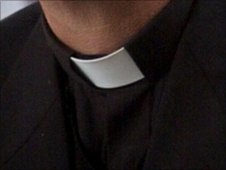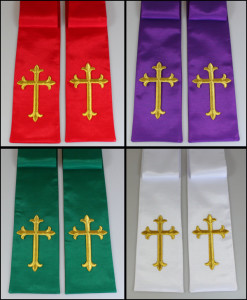
Admission to the religious life should not be made easy for newcomers.
What does it mean to be a ‘Christian’?
It seems to me we have reached, in this chapter, another pivotal moment in the Rule. The issue raised in this chapter comes close to my central thesis (that sounds too pretentious) to this whole ‘parish monasticism’ project: what does it mean to be a ‘Christian’?
One of the trickiest parts of my role as a minister of religion in an established church is baptisms. You can choose any Anglican church in this country and ask the minister about their baptism policy and I can guarantee that they will speak, at some point, about it being ‘complicated’ or ‘disappointing’. It is on this single issue that I begin to consider disestablishment as a useful proposal!
I don’t want to go into my baptismal theology (it’s more Baptist than Roman Catholic but I understand the role of infant baptism) but I have never seen baptism as a legitimate evangelistic opportunity. The reason it remains disappointing is that we continue to delude ourselves that the majority of people bringing their baby to be ‘christened’ want anything to do with God. We invest time in ‘preparing’ babies to be ‘christened’ because we cannot refuse but in the end a small number of these families take the promises made at the baptism service seriously or anywhere close to understanding what they are committing to. The service becomes a theological farce in my mind and it forces me to ask: what is actually going on at those secular celebrations of our profound mysteries of God’s grace?
So, yes, I’m pretty distressed about this and easily slip into emotional rhetoric on the subject but to try and outline a positive response to the dilemma I will return to the question: what does it mean to be a ‘Christian’?
I ask this question at preparation evenings we host for potential baptism families. The phrasing of the question is important; I ask,
If your child, when they are 7 or 8 years old, comes up to you and asks, “Mummy/Daddy, are we Christian?” What will you say? And they ask, as they are likely to do, “why?” What will your response be?
From my year and a half of asking this question I have yet to hear any answer other than,
Yes. You were christened.
My heart sinks when I go month after month desperately hoping that one day someone will articulate in some way their desire to know Jesus. After they’ve answered I talk, quite passionately, about being a Christian, about following Jesus, wanting to be transformed into His likeness, to acting, speaking, loving like Jesus, to inviting him to direct my life, my behaviours and my attitudes. I, like many ministers, comfort myself with the only thing left to us: the ‘planting seeds’ analogy.
It is not that I don’t understand the sowing analogy but I have major theological issues when we’re sowing seeds at the point of baptism, our welcoming of new Christians into the Kingdom of God. Infant baptism, for me, relies, in part, on the faith of the parents and/or godparents. Of course, baptism relies on the grace of God and God’s relationship with the child but there remains big questions over whether salvation can be removed from someone; can someone turn away from God’s grace? It is about free will and choice in the matter of relationship with God. If choice is taken away from baptism then we may as well go round pouring holy water over people and proclaiming faith over them!
No, it will not do, for me!
Here, in the Rule of St Benedict, we hear of the admission to the religious life not being made easy for newcomers. In my heart I believe that baptism into the Christian faith ideally should be akin to taking up monastic vows. This does not deny infant baptism for the commitment made in that instance still takes the vows of the parents and/or godparents.
But, Ned, that’s monasticism and not ordinary folks!
Why do we still differentiate so much in this respect? Why can we not take the model of monasticism for general faith? Why must there be different levels of holiness, one level reserved only for the ‘monks’? Why do we not expect all Christians to be holy?
I have been reading Dietrich Bonhoeffer recently and studying his views on ‘new monasticism’ as well as discipleship. I’ve recently been skimming through his ‘Letters and Papers From Prison’ in which he begins to outline a book he never had the chance to complete. In this book he begins to formulate a ‘religionless Christianity’. The argument, for me, is persuasive but, unfortunately, he never fleshed out the practical implications of his theories. If I ever return to academic study I would probably base my dissertation on Bonhoeffer’s use of monastic models in his view of Christian discipleship.
His use of monastic metaphors began well before his time in prison of course. It was in his book ‘The Cost of Discipleship’ that I first came across his explicit use of monasticism.
The expansion of Christianity and the increasing secularization of the church caused the awareness of costly grace to be gradually lost. The world was Christianized; grace became common property of a Christian world. It could be had cheaply. But the Roman church did keep a remnant of that original awareness… Here on the boundary of the church, was the place where the awareness that grace is costly and that grace includes discipleship was preserved. People left everything they had for the sake of Christ and tried to follow Jesus’ strict commandments through daily exercise. Monastic life thus became a living protest against the secularization of Christiantiy, against the cheapening of grace. (Dietrich Bonhoeffer, Discipleship (Minneapolis: Fortress Press, 2001) p.46-7)
This whole section from the chapter on ‘Costly Grace’ jumps from the page and into our time. He attacks the division of the church into ‘a highest and lowest achievement of Christian obedience’. The work of the monks was used to justify the lack of discipleship of the many in churches.
But the decisive mistake of monasticism was not that it followed the grace-laden path of strict discipleship… Rather, the mistake was that monasticism essentially distanced itself from what is Christian by permitting its way to become the extraordinary achievements of a few, thereby claiming a special meritoriousness for itself. (Ibid., p.47)
Prior to his publication of ‘The Cost of Discipleship’ Bonhoeffer wrote to his brother and proclaimed,
The restoration of the Church will surely come from a kind of new monasticism, which has in common with the old kind only the uncompromising nature of life according to the Sermon on the Mount, following Christ. (Dietrich Bonhoeffer, Testament to Freedom (San Francisco:HarperSanFrancisco, 1997), p.424)
If you put these two writings together you can see Bonhoeffer beginning to formulate an ecclesiology which broke down the cloistered walls and brought the discipleship of the monastic life into the wider Church. Bonhoeffer goes on to use the biography of Luther, himself a monk, who ‘escaped the monastery’ to bring the discipleship to all the world.
By the time he reached prison, Bonhoeffer was grasping the implications of this ‘new form of monasticism’ which was based fully in the world. Part of Bonhoeffer’s argument for a ‘religionless Christianity’ centres on the un-biblical premise that Christianity is a cosmic escape plan from this world to heaven. In this schema Christianity is a religion interested only in metaphysics and individual salvation. His prison letters to his friend Eberhard Bethge, critiques our modern view of Christianity which desperately attempts to preserve itself against an increasingly forceful argument against the existence of God. In an baptismal homily written for Bethge’s son, Bonhoeffer writes,
Our church, which has been fighting in these years only for its self-preservation, as though that were an end in itself, is incapable of taking the word of reconciliation and redemption to mankind and the world. Our earlier words are therefore bound to lose their force and cease, and our being Christian today will be limited to two things: prayer and righteous action among men. All Christina thinking, speaking, and organizing must be born anew out of this prayer and action. (Dietrich Bonhoeffer, Letters and Papers from Prison (London: SCM Press, 2001) p.105)
If the reality of faith in Christ that God does not desire us to leave this world or be concerned with other worldly things but to follow Christ in committing to this world in all its suffering and challenges then what place does something as religious and metaphysical as prayer have in this faith?
I discovered later, and I’m still discovering right up to this moment, that it is only by living completely in this world that one learns to have faith. One must completely abandon any attempt to make something of oneself, whether it be a saint, or a converted sinner, or a churchman (a so-called priestly type!), a righteous man or an unrighteous one, a sick man or a healthy one. By this-worldliness I mean living unreservedly in life’s duties, problems, successes and failures, experiences and perplexities. In doing so we throw ourselves completely into the arms of God, taking seriously, not our own sufferings, but those of God in the world–watching with Christ in Gethsemane. That, I think, is faith; that is metanoia; that is how one becomes human and a Christian (cf. Jer: 45!)(Ibid., p137)
I know I’m quoting alot of Bonhoeffer but I think it’s important to show his thorough study towards an ecclesiology which I find helpful in pursuing this disturbing experience of baptising, wholesale, babies to parents who show no indication of any desire of relationship with Jesus Christ.
It is not with the beyond that we are concerned, but with this world as created and preserved, subjected to laws, reconciled, and restored. What is above this world is, in the gospel, intended to exist for this world; I mean that, not in the anthropocentric sense of liberal, mystic pietistic, ethical theology, but in the biblical sense of the creation and of the incarnation, crucifixion, and resurrection of Jesus Christ. Barth was the first theologian to begin the criticism of religion, and that remains his really great merit; but he put in its place a positivist doctrine of revelation which says, in effect, “Like it or lump it”: virgin birth, Trinity, or anything else; each is an equally significant and necessary part of the whole, which must simply be swallowed as a whole or not at all. That isn’t biblical. There are degrees of knowledge and degrees of significance; that means that a secret discipline must be restored whereby the mysteries of the Christian faith are protected against profanation. (Ibid., p.369-70)
And so here it is, what I’ve been building upto!
Confession of faith is not to be confused with professing a religion. Such profession uses the confession as propaganda and ammunition against the Godless. The confession of faith belongs rather to the “Discipline of the Secret” in the Christian gathering of those who believe. Nowhere else is it tenable…The primary confession of the Christian before the world is the deed which interprets itself. If this deed is to have become a force, then the world will long to confess the Word. This is not the same as loudly shrieking out propaganda. This Word must be preserved as the most sacred possession of the community. This is a matter between God and the community, not between the community and the world. It is a word of recognition between friends, not a word to use against enemies. This attitude was first learned at baptism. The deed alone is our confession of faith before the world. (Dietrich Bonhoeffer, Testament to Freedom (San Francisco:HarperSanFrancisco, 1997), p.91)
Baptism is not an opportunity to teach people the faith. Baptism must remain the result/ the response to an encounter with the resurrected Jesus in this world. Baptism is the secret admission of another into the community which professes by its prayer and action the reality of God amongst us, reconciling and restoring this world.
Reflection
I believe, now more than ever, the reformation of the Church will come through a new form of monasticism which breaks down the cloisters and is embedded in the lives of all Christians. By Christian I mean those who seek to know God in the world through the resurrection of Jesus Christ and his Holy Spirit. This means a Church which knows itself as disciples living contrary to the world around them but still remaining embedded in it as Jesus once did. Jesus remains enfleshed in the very reality of God and so there will never be any division between flesh and spirit.
Jesus also differentiated between the crowd and the disciples and was unashamed in the distinction. We are not disciples to sell Christ as a product. We are disciples to seek Jesus and to be more like him. The established church has lost this distinction in our baptismal theology and we continue to cheapen the power and transformation of grace by colluding with it.
Having said all of this, I fall into silence at the horror and pain of my feelings and pray earnestly for wisdom. I know that I am at the very first stages of understanding and may be heading down a treacherous path but still that dissatisfaction for where we are now.
Gracious Father, let me not be pushed down the wrong path but rather be led by your Spirit into your will and right thinking. May my mind be your servant as well as my heart and life. I pray, have mercy on us all and lead us into the path of righteousness for your Sons sake.
Come, Lord Jesus.


 Cassock Alb: Is a white garment that goes over clothes. This symbolises a clothing of the wearer in heavenly glory. This is about identifying the role of the leader of worship and not the person wearing it. The leader of worship is an expression of the character of the whole company of worshippers; they are to be the spokesperson of the collective voice of the congregation. By draping them in white it is a draping of all the people in that resurrection glory.
Cassock Alb: Is a white garment that goes over clothes. This symbolises a clothing of the wearer in heavenly glory. This is about identifying the role of the leader of worship and not the person wearing it. The leader of worship is an expression of the character of the whole company of worshippers; they are to be the spokesperson of the collective voice of the congregation. By draping them in white it is a draping of all the people in that resurrection glory.

 Cassock: Is a black garment similar to that of the Cassock Alb. At the reformation the Cassock Alb was seen as a symbolism of the abuses of clericalism where the clergy and those ordained were seen as being elevated beyond the reach of the laity. The reformers were keen to bring the work of the Church to the people and so they removed the symbolism. This reformation was focussed on the words used in the Church, hence the translation of the Bible into the common tongue. The reformation replaced the priest with the scholar, those who could read and interpret the Scriptures and the Cassock hints at the origins of being like the university gowns or the preaching monks (of which Calvin and Luther were).
Cassock: Is a black garment similar to that of the Cassock Alb. At the reformation the Cassock Alb was seen as a symbolism of the abuses of clericalism where the clergy and those ordained were seen as being elevated beyond the reach of the laity. The reformers were keen to bring the work of the Church to the people and so they removed the symbolism. This reformation was focussed on the words used in the Church, hence the translation of the Bible into the common tongue. The reformation replaced the priest with the scholar, those who could read and interpret the Scriptures and the Cassock hints at the origins of being like the university gowns or the preaching monks (of which Calvin and Luther were).
